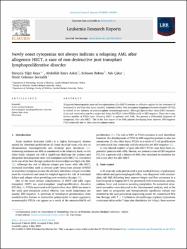Newly onset cytopenias not always indicate a relapsing AML after allogeneic HSCT, a case of non-destructive post transplant lymphoproliferative disorder

Göster/
Erişim
info:eu-repo/semantics/openAccessAttribution-NonCommercial-NoDerivatives 4.0 Internationalhttps://creativecommons.org/licenses/by-nc-nd/4.0/Tarih
2023Üst veri
Tüm öğe kaydını gösterKünye
Yiğit Kaya, S., Aşkın, A. E., Bektaş, Ş., Çakır, A. ve Gökmen Sevindik, Ö. (2023). Newly onset cytopenias not always indicate a relapsing AML after allogeneic HSCT, a case of non-destructive post transplant lymphoproliferative disorder. Leukemia Research Reports, 19. https://doi.org/10.1016/j.lrr.2023.100369Özet
Allogeneic hematopoietic stem cell transplantation (allo-HSCT) remains an effective option for the treatment of intermediate and high-risk Acute myeloid leukemia (AML). Post-transplant lymphoproliferative disorder (PTLD) is related to the intensity of post-transplant immunosuppression. Although Epstein-Barr virus (EBV) seropositivity and reactivation can be a major risk factor for PTLD. A few PTLDs could be EBV negative. There are a very limited number of PTLD cases following HSCT in patients with AML. We present a differential diagnosis of cytopenias after allo-HSCT. This is the first report of an AML patient developing bone marrow EBV-negative PTLD relatively late in their post-transplant course.
Scopus Q Kategorisi
Q3Kaynak
Leukemia Research ReportsCilt
19Koleksiyonlar
- Makale Koleksiyonu [3777]
- PubMed İndeksli Yayınlar Koleksiyonu [4230]
- Scopus İndeksli Yayınlar Koleksiyonu [6574]
- WoS İndeksli Yayınlar Koleksiyonu [6631]


















